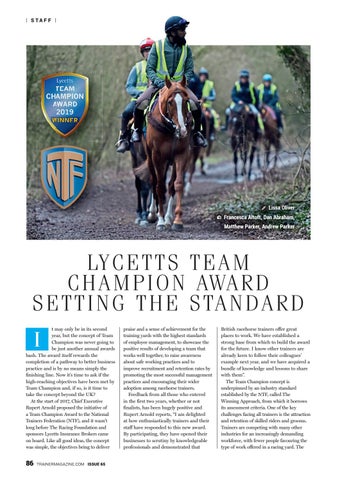| STAFF |
Lissa Oliver Francesca Altoft, Dan Abraham, Matthew Parker, Andrew Parker
LY C ET T S T E A M C H A M P I O N AWARD S ET TI NG T H E S TA ND AR D t may only be in its second year, but the concept of Team Champion was never going to be just another annual awards bash. The award itself rewards the completion of a pathway to better business practice and is by no means simply the finishing line. Now it’s time to ask if the high-reaching objectives have been met by Team Champion and, if so, is it time to take the concept beyond the UK? At the start of 2017, Chief Executive Rupert Arnold proposed the initiative of a Team Champion Award to the National Trainers Federation (NTF), and it wasn’t long before The Racing Foundation and sponsors Lycetts Insurance Brokers came on board. Like all good ideas, the concept was simple, the objectives being to deliver
I
86
TRAINERMAGAZINE.COM ISSUE 65
praise and a sense of achievement for the training yards with the highest standards of employee management, to showcase the positive results of developing a team that works well together, to raise awareness about safe working practices and to improve recruitment and retention rates by promoting the most successful management practices and encouraging their wider adoption among racehorse trainers. Feedback from all those who entered in the first two years, whether or not finalists, has been hugely positive and Rupert Arnold reports, “I am delighted at how enthusiastically trainers and their staff have responded to this new award. By participating, they have opened their businesses to scrutiny by knowledgeable professionals and demonstrated that
British racehorse trainers offer great places to work. We have established a strong base from which to build the award for the future. I know other trainers are already keen to follow their colleagues’ example next year, and we have acquired a bundle of knowledge and lessons to share with them”. The Team Champion concept is underpinned by an industry standard established by the NTF, called The Winning Approach, from which it borrows its assessment criteria. One of the key challenges facing all trainers is the attraction and retention of skilled riders and grooms. Trainers are competing with many other industries for an increasingly demanding workforce, with fewer people favouring the type of work offered in a racing yard. The
